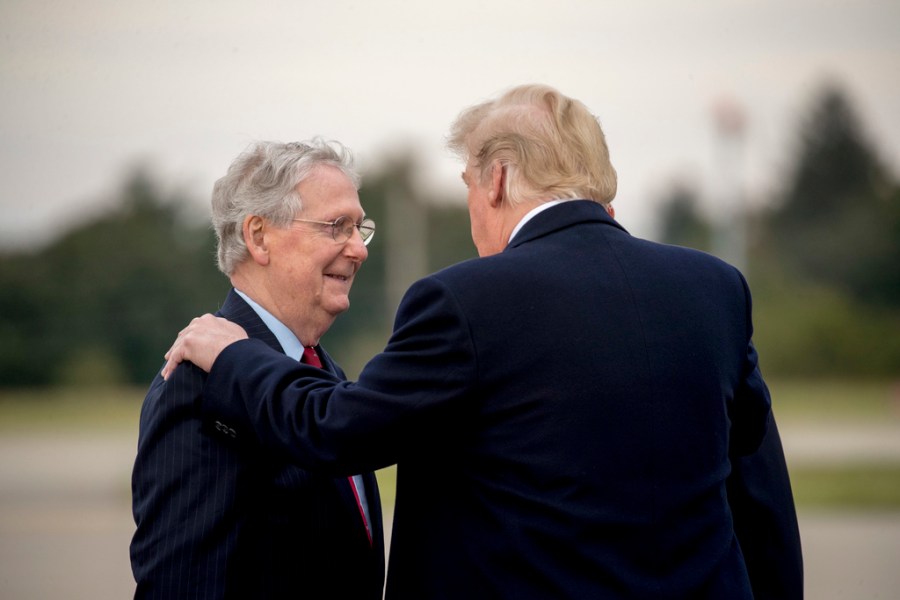
After nearly four decades in the Senate, Sen. Mitch McConnell’s (R-Ky.) long tenure is finally coming to an end. Some have hailed him as a master strategist, a guardian of conservative principles, and a fierce protector of institutional norms. But history will tell a different story — one that reveals McConnell as the architect of the Golden Age of Trump, a political era that has profoundly reshaped the judiciary, emboldened extremism and deepened the erosion of democratic norms.
For all the analysis of Trump’s rise, the fundamental groundwork was laid not in 2016, but years earlier, in the corridors of the U.S. Senate, where McConnell wielded power with cold precision. His refusal even to consider Merrick Garland’s nomination to the Supreme Court in 2016 was not just a political maneuver; it was an outright defiance of the democratic process, an act of obstructionism that set the stage for the radical transformation of the judiciary.
That single decision led to the appointment of Neil Gorsuch, setting in motion a chain reaction that culminated in a conservative-dominated Supreme Court and the overturning of Roe v. Wade — a decades-long conservative goal.
McConnell has long understood the actual levers of power in American government: the judiciary. While the presidency and Congress change hands, the courts provide an enduring legacy. From the moment Barack Obama took office, McConnell dedicated himself not to governing but to obstructing and blocking more than 100 judicial appointments under Obama. His goal was clear — keep the courts open for a future Republican president to fill.
When President Trump took office in 2017, McConnell seized the opportunity to reshape the judiciary quickly. He eliminated the filibuster for Supreme Court nominations, confirming Gorsuch, Brett Kavanaugh and Amy Coney Barrett in four years, cementing a 6-3 conservative majority. These justices went on to deliver the ruling that overturned Roe v. Wade in Dobbs v. Jackson Women’s Health Organization, stripping millions of women of their constitutional right to abortion.
This was McConnell’s ultimate triumph — one that had nothing to do with Trump’s political instincts and everything to do with McConnell’s years-long plot to shift the courts rightward. Trump may have appointed the justices, but McConnell made it possible.
It is tempting to view McConnell and Trump as political opposites — one a traditionalist steeped in institutional knowledge, the other a chaotic, anti-establishment force. But this is a false dichotomy. McConnell may have privately detested Trump, but he enabled his worst excesses at every turn.
McConnell’s refusal to convict Trump in both impeachment trials — including after the Jan. 6 Capitol riot — was a calculated decision. He denounced Trump on the Senate floor but ultimately ensured he would face no consequences for his actions. This was not about loyalty to Trump but loyalty to power. McConnell needed Trump’s base to continue his judicial project, so he protected him.
Even after Trump left office, McConnell remained complicit, allowing the Republican Party to morph fully into a vehicle for Trumpism. He may have thought he could control the populist forces Trump unleashed, but he miscalculated.
McConnell is now leaving, and the party he helped build is increasingly in the grip of extremists who reject the very institutions he spent his career defending. He will undoubtedly be remembered as one of modern history’s most consequential Senate leaders. But his legacy is not one of statesmanship — it is one of partisan manipulation, judicial stacking and an abdication of democratic responsibility.
For all his strategic brilliance, McConnell’s long game has led to a party consumed by Trumpism and a Supreme Court whose rulings are out of step with most Americans. He won the battle, but in doing so, he lost control of the war.
As he steps away, he leaves behind a nation more divided, a court more extreme and a democracy more fragile than ever before. The Golden Age of Trump did not happen in a vacuum — it was built, step by step, by McConnell himself.
Quardricos Bernard Driskell is a federal health care lobbyist and an adjunct professor of legislative politics, where he teaches race, religion and politics at George Washington University Graduate School of Political Management.












